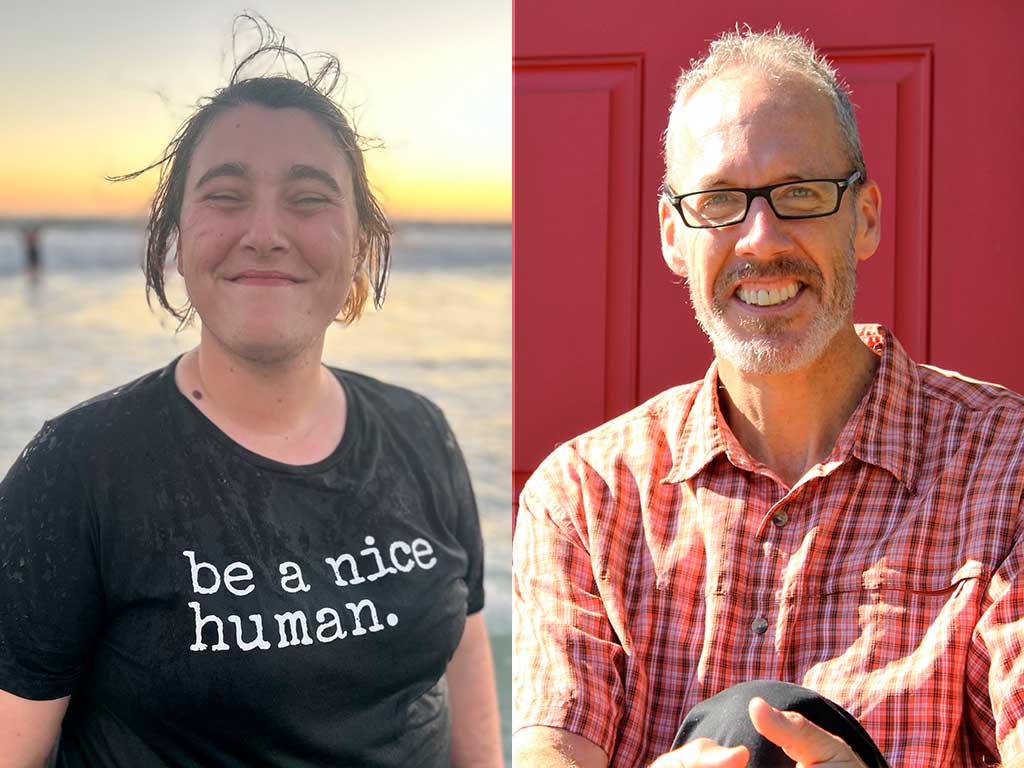
Jess Falero and Cullen Ryan: A conversation about unsheltered homelessness

Every month PelotonLabs founder Liz Trice interviews a community member for The West End News. This month Liz caught up with Jess Falero and Cullen Ryan.
Jess has experienced homelessness, is a peer advocate, community organizer, and emerged as a leader during the 2020 homeless encampment at Portland City Hall. Cullen has over 36 years of experience working with people experiencing homelessness as a clinician, advocate, and housing developer. Cullen is the Executive Director of Community Housing of Maine (CHOM), the largest supportive housing provider for people who have experienced homelessness.
Listen to the entire conversation: https://thewestendnews.podbean.com/e/pelotonposts-jess-falero-and-cullen-ryan-discuss-unsheltered-homelessness/
Liz: What’s the current situation with the encampments that have been cleared? Where are people going?
Cullen: A lot has changed in the last two months. The city council allowed 50 extra beds at the Homeless Services Center (HSC) and worked with the Greater Portland Council of Governments (GPCOG) to create a shelter specifically for single adult asylum seekers. So that freed up 170 beds, and the city prioritized beds for people who were unsheltered. The city also removed some barriers that stood in the way of people coming inside. The result was many people coming inside to the HSC, Milestone, Florence House, and Elena’s Way. We’ve gone from a peak on October 6th of 282 tents all the way down to maybe 50 tents before the sweeps in early January. The number of people outside is maybe a quarter of what it was and closer to what it was last winter. That’s big progress.
Liz: What were some of the barriers that were lowered?
Cullen: The city made the “curfew” later – people have to let them know if they need a bed by a certain time. That time used to be 6 p.m., then 9 p.m., and has now been moved to 11 p.m. People can stay out even later if they communicate that need. The Humane Society is now providing safe harbor for pets. People can lock their belongings outside before coming in and access those belongings any time, day or night. People can spend time with their partners in the common areas of the building – just sleeping areas are separated by gender.
Liz: Jess, tell us what you’re hearing and seeing.
Jess: I’m not pro-sweep. But Cullen is right, people tried out the shelter who otherwise would not have tried it out. But just because something is effective, doesn’t mean that it’s humane. Encampment sweeps are inherently violent. It’s very harsh to say, “I’m going to destroy this home you built, and your only option is to access the shelter that you’re afraid of.” It wasn’t handled in an ethical way that allowed people their own autonomy. People on the streets are incredibly vulnerable, and people making the decisions for them are not vulnerable, so there is a power difference there.
We need to talk about the ways shelters are unsafe and unprepared for the people showing up right now. Some people have severe trauma, or severe mental illness, or are veterans, or just don’t have the skills to handle themselves as tactfully as people would like. So I’m concerned that the folks are going to end up leaving or getting kicked out. Shelters are a bandaid and can actually perpetuate the systemic issues that are happening in our world.
Liz: How are shelters unsafe?
Jess: I’m sure both of you have had roommates before, and roommates can come with their own drama. When you’re in a 200-bed shelter, you have 199 roommates – people that have been on the streets, through domestic violence, human trafficked, in the prison system, in foster care – and they have been severely traumatized. A lot of unhoused people have complex PTSD, which is caused by consistent, nonstop, one traumatic experience after the other.
During my time at the Florence House, I saw so many horrible things. I was harassed on a daily basis by different people, and you’re not allowed to defend yourself without losing your bed. Most people can’t ignore being harassed over and over and over again. If housed people get harassed, they just go home and shut their door, or they’ll call the police. But you can’t do that when you’re in the shelter: you’re not entitled to that and you don’t have a door to close. Privacy is so important. It is life saving, when somebody can just close their door!
At Florence House, we had somebody who every single morning would have a stress seizure, fall in the middle of the lobby, and hit her head, and be bleeding all over the floor, and you’d have a fight going on, and two ambulances and the police trying to get in. When you wake up regularly to that kind of chaos, it stores in your body. The body keeps the score. It holds on to all that unprocessed trauma, and your brain will dissociate and protect from that moment and affect you for the rest of your life. Chronic trauma and homelessness takes 28 years off a person’s life.
Jess: It’s not just “Let’s bring everybody indoors and then we all sing Kumbaya.” The fights that you see down at the encampment are going to happen at the shelters, too.
People are doing their best, but if you throw somebody out into the wild, and you make them survive that long, they end up becoming wild. You can’t be surprised by that. If I’m sleeping outside, I’m going to carry something to protect myself. Nobody wants to see what happens to people because it’s so horrifying. We’re seeing systemic trauma happen before our eyes. But conflict isn’t inherently bad. The solution is to be willing to see what needs to be addressed and then do something about it. We keep coming to this conflict because we haven’t addressed it yet.
Cullen: The safety and security of housing is health care. Psychotic symptoms are exacerbated by stress, and the most stressful situation you could be in is chronic homelessness. Sometimes when we move a person with psychotic symptoms into housing, we watch their symptoms disappear right in front of our eyes as if they took medications. Shelter is an important interim step, because we’re much better at getting people housed from shelters than we are from outside.
Jess: We need to absolutely bring people into housing, because of Maslow’s hierarchy of needs. The second step is community support, because people are inherently social creatures and we need each other. This is why I love Housing First, it wraps around the 24/7 support. I love Greater Portland Peer Services.
Cullen: So when we see someone struggling with substance use disorder, and we’re watching them slowly die in front of us, when is it okay for us to step in and say, “Hey, we want to intervene and make sure that you’re safe?” That “you deserve love and warmth,” but in an empowering fashion?
I’ve always felt that it was within reach for us to solve homelessness in Maine. We have a finite population; we have an almost adequate shelter network. We have pathways into housing, and we know almost all the people who experience homelessness by name because our numbers are so small. I think we can end it. I don’t want to allow a society that comes to be accustomed and accepting of unsheltered homelessness.
Jess: I really appreciate the question. I think that we need to be careful about trying to step into other people’s lives and telling them what they need, because we can’t possibly know.
But I do know from my own life, that people that have sat with me, regardless of where I was at, and kept reminding me about my inherent worth, regardless of where I was at that moment, and that changed my life forever. And if it wasn’t for those people, I wouldn’t be here.
Cullen: Recovery happens in community when people feel good about themselves. That takes days, months, years to establish, but it starts with somebody giving them the message that they are worthwhile.
Jess: And that person is usually somebody who they trust. I don’t feel like either one of us is saying, “It’s okay for you to be outside.” We want to say, “It’s okay for you to be where you’re at. We would love it if you went inside, it’s really cold out here. You may freeze to death.”
Those are loving conversations we can actually have with people. But it’s a really hard line to hold. The real issue is that the shelters are not set up for everyone to be in. You know, if the shelter was set up, and it was safe, and it was a place for everybody that could get what they needed, like I would 100% be like: “Tough love, let’s get you in the shelter. It is a safe place for you to go.” But it’s not true.
Cullen: So you can’t force people to come in, and you can’t not do anything. You know, it makes me think that I am certainly not pro-sweep. I’m pro-inside, pro-challenging people to come inside.
We need structures for people to be indoors with warm food, warm showers, privacy, a welcoming environment, and encouragement for people. We need to ensure that shelters have sufficient emergency capacity for the ebbs and flows of homelessness by keeping the extra 50 beds as needed. Also, we need to meet people with support services, healthcare, outreach services, and we really are short on all those. I don’t think we’re going to get everybody inside. But if it remains our goal, then we will strive towards it as a city, and we will get almost everyone inside. And for the few remaining people outside, we can do our best to build relationships and get them directly into housing. Or into the shelter if we can remove those barriers.
Jess: I think you answered that perfectly.
Liz: What would you do with $10M to reduce unsheltered homelessness in Portland?
Jess: I would open transitional housing to get people directly off the streets and allow them to have one-on-one support. I wouldn’t have more than five people in the house, and I would have at least three to four staff at all times. And there wouldn’t be a timeline about how long people can stay, because everybody is different.
Cullen: I would hire 10 people, for 10 years, to be “housing stability workers.” They could serve 200+ people per year. Right now you have to bill MaineCare, and you spend half your time billing. Everything has to fit into the box of health care. But a lot of what people need doesn’t fit neatly into billing for health care. And once people have housing, people have a pathway to wellness.
Updates since the interview (as of 1/29/2024)
Cullen: The city went from a peak of 282 tents in October to 38 tents last week, which represents an 86.5% reduction in unsheltered homelessness. Outreach workers are indicating the number of people outside is lower this winter than last winter, before the encampment crisis. People are coming inside and the policy changes appear to be working.
Jess: The number of beds fluctuates at the shelter daily – it would be nice to start collecting data to address the fluctuation.
Disclaimer: Neither Jess nor Cullen work directly with anyone who is accessing services at the Homeless Services Center.
Resources
Community Housing of Maine: https://www.chomhousing.org
Church of Safe Injection: https://www.churchofsafeinjection.org/
Listen to the entire conversation:
Content Disclosure: This podcast contains frank and open discussions and stories about sensitive topics, including homelessness, medical trauma, physical violence, harassment, and drug use. We strive to be respectful and considerate but acknowledge that some listeners may find certain content upsetting or challenging. Names have been removed to protect confidentiality.
PelotonLabs is a coworking space in the West End of Portland, Maine with a mission to connect and encourage people working on their own to manifest their visions without fear.





